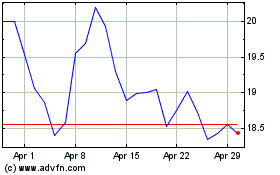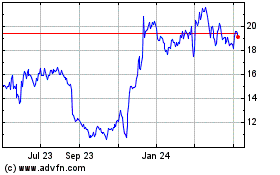By Suzanne Kapner
With just two weeks until Black Friday -- the day after
Thanksgiving that kicks off the holiday season -- executives at the
nation's biggest department stores said Thursday they are seeing
signs that consumers are turning their attention from voting to
shopping.
Macy's Inc. and Kohl's Corp. cited improving sales trends and
gave upbeat outlooks for the key holiday season, despite posting
another quarter of declining sales, as the chains struggle with
changing shopping habits and competition from discounters.
Nordstrom Inc., meanwhile, reported a sales increase and lifted its
financial targets for the year.
"We have momentum coming out of October," Kohl's Chief Executive
Kevin Mansell said. "We feel we're very well positioned for the
upcoming holiday season."
Shares of the companies rallied in Thursday's trading, giving a
lift to other retail stocks.
Mr. Mansell worried about an election hangover, due to
uncertainty about President-elect Donald Trump's agenda. But Macy's
CEO Terry Lundgren said: "To have a group of the population feeling
like their voices have been heard is a positive thing." With wages
rising and unemployment low, he added, "there is a potential for
consumers to spend in the fourth quarter."
Mr. Mansell said better inventory management could help shield
the company from seasonal or political volatility. "We are doing
things with an eye to the long-term," he said. This should
"continue to benefit us regardless of whether or not you think the
consumer is in a buying mood for holiday or is still not so
much."
A more complete picture of the consumer mind-set will emerge
next week when other large chains such as Wal-Mart Stores Inc.,
Target Corp. and Home Depot Inc. report their latest results.
Perhaps even more important than the impact of the election on
retail sales is the unseasonably warm weather in much of the
country. Although inventory levels are in good shape compared with
a year ago, that could change if cold weather doesn't materialize,
leading to "another over-inventoried, heavily-promotional holiday
season," Citi analyst Kate McShane wrote in a note to clients.
Macy's booked a 2.7% decline in same-store sales in its latest
period, the seventh straight quarter in which sales and profits
have declined. The retailer also struck a deal Thursday with
Brookfield Properties that could further shrink its retail
footprint.
Kohl's same-store sales fell 1.7% in the period, its third
straight drop, despite what it said was a strong back-to-school
shopping period. Unlike Macy's, most of the chain's locations
aren't in traditional shopping malls, and the company doesn't plan
to shrink its store base.
Nordstrom said sales at existing stores rose 2.4%, its first
increase in two quarters. Lower inventory levels at its stores, and
throughout the industry as a whole, are resulting in fewer
discounts and more stable margins, the chain said.
Sales at existing Hudson Bay Co. stores also fell in the period,
including a 4.6% decline at its Saks Fifth Avenue chain.
Shoppers increasingly are opting to make purchases online,
especially at Amazon.com Inc. or at fast-fashion chains such as
H&M Hennes & Mauritz AB, leaving department stores
struggling with lower foot traffic.
Both Macy's and Kohl's have tried to adapt. Macy's has been
closing weaker stores and adding kiosks that sell Apple Inc.
watches or other electronics. Kohl's has brought in more national
brands, such as Nike Inc. and American Girl dolls. But both still
rely on heavy discounts to drive foot traffic.
Neil Saunders, the chief executive of Conlumino, a retail
research firm, noted that Macy's made just 2 cents for every $1 in
revenue in the latest quarter. The results, Mr. Saunders said,
"show a company grappling with what looks like a terminal
decline."
Some brands, such as Michael Kors Holdings Ltd. and Ralph Lauren
Corp., that historically have relied heavily on department stores
are pulling back from those chains in an effort to sell more goods
at full price. On Thursday, Ralph Lauren reported that sales to
department stores fell 10% in its latest quarter, while Michael
Kors said sales in the channel tumbled 18.4%.
Macy's said the average purchase price of an item increased
during the quarter, which helped offset fewer transactions, and
that online sales continued to grow by double digits.
Comparable inventory declined 3% putting the company on stronger
footing heading into the holidays than last year, when it resorted
to discounting to clear unsold goods. Macy's reaffirmed its profit
forecast for the year, and said it expects sales to decline less
than expected.
Overall, Macy's reported a third-quarter profit of $17 million,
down from $118 million a year earlier, hurt by restructuring costs.
Sales fell 4.2% to $5.63 billion.
On the real estate deal, Macy's said Thursday that Brookfield
would be able to redevelop up to 50 properties, either by adding on
to a particular store or revamping the entire site. Financial terms
weren't disclosed. "They will reimagine not just some of our store
locations, but our parking lots, and property we own," Mr. Lundgren
said.
The Brookfield deal is part of Macy's strategy to generate value
from real estate as many of its stores underperform in a rocky
retail environment. Over the summer, Macy's said it would shut 100
more stores, about 15% of its base, in addition to 40 closures
announced earlier this year. Activist investors have called for
Macy's to generate more value from its real estate.
Macy's shares, which have climbed 13% in the past three months,
popped up 5.6% on Thursday, while shares of Kohl's rose 11.5%.
Nordstrom shares climbed 7.2%, and shares of J.C. Penney Co., which
reports earnings Friday morning, jumped 5.4%.
Kohl's profit rose 22% to $146 million. Revenue fell 2.3% to
$4.33 billion. For the period ended Oct. 1, Ralph Lauren reported a
profit of $45 million, down from $160 million a year earlier.
Revenue declined 7.6% to $1.82 billion. Sales at the company's
retail stores, excluding newly opened and closed locations,
declined 8%.
Earlier this year the luxury apparel and accessories company
embarked on a turnaround plan that included refocusing on its core
Ralph Lauren, Polo and Lauren brands, as well as store closings and
job cuts.
--Joshua Jamerson, Ezequiel Minaya and Imani Moise contributed
to this article.
Write to Suzanne Kapner at Suzanne.Kapner@wsj.com
(END) Dow Jones Newswires
November 10, 2016 20:00 ET (01:00 GMT)
Copyright (c) 2016 Dow Jones & Company, Inc.
Macys (NYSE:M)
Historical Stock Chart
From Mar 2024 to Apr 2024

Macys (NYSE:M)
Historical Stock Chart
From Apr 2023 to Apr 2024
